
| The web isn't completely broken |
| Greg's rants |
| Greg's home page |
| Greg's diary |
| Greg's photos |
| Greg's links |

|
|
|
This document was written in late 2007, and has had only cosmetic changes since. It's sad to see how little has changed in the nearly 10 years since it was written.
The world-wide web is marvelous! What a wonderful idea! The ability to link a whole world of information in an ad-hoc way must really count as one of the major breakthroughs of 20th century information technology.
But that's been a while now. Since then, there have been “improvements” that make the whole thing look like a tower of Babel. My personal impression is that things have been deteriorating for several years, and there's no sign of it stopping.
One of these days I'll get round to a systematic description of everything I find annoying about the web culture, but for the time being I'll just summarize here and add quotations from my diary.
The problems I see mainly derive from a lack of perspective on the part of the people designing both web software and web pages. They include:
Lack of understanding of the X Window System. I don't know of any browser that can open windows on more than one display.
The “there can only be one” approach. Most web browsers only allow one instance to run. If you try to start a second, what happens depends on your default display. If it's the same as the display of the running instance, like firefox produces: for example just opens another window. If you try to start one on another display, which with X could be anywhere in the world, you get the stupid message:
“Firefox is already running, but is not responding. To open a new window, you must first close the existing Firefox process, or restart your system”.
Given this degree of breakage, it's not surprising that when firefox exits, it returns a condition code 0 (success).
I've frequently complained about the shortcomings of web browsers, but I haven't really clearly stated what I want. Here's a first step. It's not complete: I'm leaving out things that most or all web browsers already supply.
Must be able to handle multiple instances. firefox can't, for example; if you try to start a second one, it attaches to the first if it can.
Must be able to display on multiple screens. If I'm connected to a machine via the network, I may still want to use a browser on that machine (for example, to look at local files).
Again, firefox can't. If you try to start an instance on a new screen, it doesn't attach to the one on the other screen. Instead, it reports that there is another instance running, that it can't communicate with it, and that you should reboot your machine. This is unlike the behaviour of OpenOffice, which will attach to the other display, which could be anywhere in the world. Neither behaviour is useful.
Must offer reasonable keyboard handling; it's getting better. But it needs to be a whole lot better before I'll be happy. firefox 2.0 has annoyed me by hijacking a number of keys (notably Alt-P and Alt-S, which are used by the Wikipedia editor for preview and save respectively).
Access to an external editor. No browser has a high-quality editor—why should it? It's a completely separate function, and people who use editors seriously want to use the one they're used to. Programs like mutt allow users to configure access to an external editor. Why don't web browsers? There was one plugin for firefox, but it had serious issues, and firefox 2.0 no longer supports it.
Should allow scaling of all text in one operation. Setting up browsers to display legibly on a 2048x1536 screen is really difficult; I haven't managed at all with firefox. You can scale the displayed text, but the menus stay in the same font, which at that resolution becomes illegible.
Should not require constant resizing of the text. I don't know how best to get this, but some browsers seem to present different pages at markedly different sizes, and it's a real pain.
There are a couple of other things that I haven't mentioned here, because I consider them bugs in firefox (i.e. unintentional behaviour, as opposed to its myriad misfeatures):
These are diary excerpts in chronological order.
Trying a new web browser again today. I had discovered a web site for the Le trésor de la langue française, unfortunately with really broken HTML. Due to the lack of character encoding data, it would at random display all accents as ?, making it almost illegible. That's not really netscape's fault, of course, but I thought I should set a default character encoding. After hearing great things about firefox, decided to install it.
People say that firefox is a small, fast browser. The source tree was 430 MB, about the same as for the entire FreeBSD operating system, and it took a couple of hours to compile. By comparison, Emacs, once the benchmark of bloatware, is done almost instantaneously, in less than two minutes. When firefox was done, all my Emacs key bindings were gone and had been replaced with something Microsoft-like. Nobody I knew seemed to know how to reenable them; it seems that people don't use editors any more.
No, this isn't a vi/Emacs rant. It's a question of being able to use any kind of editing commands beyond Backspace without taking your hands off the keyboard. This seems so basic to me that it shouldn't be removed without a very good reason (not stated) or at least as an option.
Spent some time looking for how to reenable the keys. You'd expect that it would be possible via the Preferences menu, but it seems that all browsers nowadays expect to run under other bloatware like GNOME and KDE. Is this really the way software should be evolving?
Finally found the answer with google. I had to create a file ~/gtkrc-2.0 and add the following entry:
gtk-key-theme-name = "Emacs"
Not a big deal in the end; what surprises me is that nobody seems to care any more. Is this a sign of growing illiteracy?
Another new development that everybody except me seems to love is “tabbed browsing”. This is an attempt on the part of individual programs to take over the job of a window manager, and to ensure that you don't see more than one window at a time. This baffles me: it seems to be so much the opposite of what anybody would want. I'm still trying to understand some advantage in the concept. Is it maybe because window managers are becoming too complicated, or that the reliance on the use of a mouse has made it inconvenient? Spent some time trying to find a way to disable the feature, finally finding a plugin that completely disables tabbed browsing. Surprises weren't over, though. I couldn't download the plugin: I had to let the remote site install it. What kind of security model is that?
firefox is an enigma. Turns out that I can't just install flash on it (Macromedia claims it can't find anything for my platform; maybe I need to find a way to pretend to be a Linux system), and for some reason I see the same rendition problems that I've already seen on Opera and Microsoft “Internet Explorer”: the lines are far too far apart in relation to the (relatively large) font. By contrast, Netscape gets it right. This time I didn't find any knobs to twiddle, and when I discussed it online, the general feeling was “that's the way things are nowadays”. Do we have to throw out long-established best practices in the name of ”progress”?
Orkut has a new service: a CSV-separated list of “friends” and their (real) email addresses. That sounded like it was useful, so I used firefox to download it. The result shows me yet again how terrible the modern “Desktop” paradigm is. After downloading, I got the following window:
I'm getting to hate this abuse of the existing term open to mean “display”. In this case I wanted to save it to disk, but just out of interest, I selected Browse. What I got was:
In other words, the application is looking for executables in my home directory. I have no idea what the yellow date (written the wrong way round) is, but it seems completely unaware of the concept of a PATH environment variable, even though Microsoft had it 20 years ago. It also separates the directory name part and the file name part of the pathname, and it displays in a window so tiny that not a single line can be completely displayed, and only displays three lines. This is on a monitor with 2048x1536 resolution. It is possible to specify the pathname in the File name field, but of course it needs to be expanded to be even remotely usable.
I wanted to save to disk, of course, so I selected that option and got:
Where did it put the file? ..., it would seem. Expanding the (again) too small window showed:
Well, that's something, but not very much. Where's the pathname? Where is Desktop? The answer is: nowhere. I don't have a directory or file called Desktop:
I did have sufficient distrust to check that it didn't store the file in the /usr/X11R6 hierarchy, but it didn't.
So where did the file Contacts-1.CSV go? Used ktrace to help me there:
1351 firefox-bin NAMI "/home/grog/contacts.CSV" 1351 firefox-bin RET access 0 1351 firefox-bin CALL access(0xaa67ac8,0) 1351 firefox-bin NAMI "/home/grog/contacts-1.CSV" 1351 firefox-bin RET access 0 1351 firefox-bin CALL access(0xaa67ac8,0) 1351 firefox-bin NAMI "/home/grog/contacts-2.CSV" 1351 firefox-bin RET access 0 1351 firefox-bin CALL access(0xaa67ac8,0) 1351 firefox-bin NAMI "/home/grog/contacts-3.CSV" 1351 firefox-bin RET access 0 1351 firefox-bin CALL access(0xaa67ac8,0) 1351 firefox-bin NAMI "/home/grog/contacts-4.CSV" 1351 firefox-bin RET access -1 errno 2 No such file or directory 1351 firefox-bin CALL open(0xaa67ac8,0xe01,0x180) 1351 firefox-bin NAMI "/home/grog/contacts-4.CSV" 1351 firefox-bin RET open 22/0x16 1351 firefox-bin CALL close(0x16)
So it put it in the home directory. While that's a good idea from my perspective, how can I possibly know from this ridiculously obfuscatory window? Instead of a window in the first place, which I have to then explicitly select with the mouse and then close, wouldn't the following simple message on the status line be so much better?
File saved as /home/grog/contacts-4.CSB
Of course, as kdump shows, the file name wasn't Contacts-1.CSV at all. firefox gets its list backwards, so the name it chooses is placed at the top of the list. I really can't understand why so many people use this reverse listing. I wonder how long it's going to be before we're going to have to start reading pages in books and newspapers from bottom to top.
I've had enough of firefox. I want a browser that I can use, not spend all my time trying to work out how to install which plugin. The typical situation is with Macromedia plugins. Following the link, you get:
(All these images are reduced; click on them to get an idea of the original size, and recall that they're displaying on a 2048x1536 display with about 140 dpi). So I installed Opera in the hope of it working better. It didn't. Even on startup, I get:
That's obviously an installation problem; but isn't that what the Ports Collection is there for? It doesn't seem to stop it from working, except for Java, but when I try the Shockwave plugin, I get only a little further:
Of course, the table of recommended “Web players” has nothing useful. It's also not clear how to set the font sizes on Opera: I set a minimum of 20 pixels in the preferences, yet the headings and the URL window are much smaller:
Those letters must be about 10 pixels, and on a 2048x1536 display they're legible, but barely and uncomfortably.
In the evening, restarting the TV system was interesting. It had been up for two months, during which time I had done some tweaks to the X configuration, notably specifying the screen dimensions:
screen #0: print screen: no dimensions: 1280x736 pixels (2956x1699 millimeters) resolution: 11x11 dots per inch
Starting firefox gave a very similar problem to what I had had on wantadilla in the afternoon: the headings were illegible:
I wasn't able to fix that. My best bet is that firefox is still thinking in “points” instead of pixels. A point is roughly 1/72", so a 10 point character is about 0.139", or about 1.5 pixels. Clearly this makes no sense. Tried Opera to see if that was any different. It was:
Again, no way to reset the values. It looks like I'll have to stop X and not tell it the dimensions of the screen. But what a mess! If this had been done in PostScript or PDF, there would have been no problem at all.
I've always wondered why, in some cases, web browsers such as firefox won't restart after a crash, claiming that the “profile” is in use. Today it happened again. I knew that this information seems to be stored somewhere in the directory ~/.mozilla, but I couldn't remember where. find didn't show up anything much:
Looking at the directory (in this case with emacs, sorted by date) was more useful:
/home/grog/.mozilla/firefox/oiq6n8jm.default: used 2 available 967 -rw-r--r-- 1 grog wheel 115312 Oct 23 11:34 history.dat drwxr-xr-x 2 grog wheel 512 Oct 23 11:33 Cache drwx------ 6 grog wheel 1024 Oct 23 11:22 . -rw-r--r-- 1 grog wheel 14671 Oct 23 11:22 cookies.txt -rw-r--r-- 1 grog wheel 7468 Oct 23 11:04 localstore.rdf drwxr-xr-x 2 grog wheel 512 Oct 23 11:03 Cache.Trash lrwxr-xr-x 1 grog wheel 19 Oct 23 11:03 lock -> 192.109.197.145:950 -rw-r--r-- 1 grog wheel 1740 Oct 21 10:14 downloads.rdf
That file lock looked suspicious, and from past recollection I know that removing would be enough to work around the problem. But why should it be a problem? 950 looked like a process, so:
Coincidentally that was the same emacs that showed the previous display. After stopping it, firefox started with no problem. So the real issue is that firefox doesn't do adequate checking before refusing to start. The date of the symlink was earlier than the boot time, and the process wasn't another firefox.
Spent some time trying to book a flight to Dunedin, which took me another two hours, not the least caused by broken web sites. The best bet was a “local” carrier, Freedomair, whose web site looked relatively unbroken for an airline web site:
But after filling out the flight dates, what next? Where the Search button? It's hidden behind the “Route Guide” and “Ask a question” images. Arjen helped me there: with the settings View –> Page Style –> No Style (under firefox) the display changes to this:
Getting seating was still a challenge: it seems that the URL for changing to the return flight was broken, and the only way to get to it was to tab through the URLs and watch what appeared at the bottom of the screen. Again a trick that Arjen taught me.
Another interesting thing about GNOME is that I was able to get the top menu bar to display on wantadilla, my main machine, which runs fvwm2 as its standard window manager; this could be a good compromise between the GNOME menus and the flexibility of fvwm2. Today, though, it confused things: for some reason, it slowed down the repeat rate of the keyboard, and also disabled kbdcontrol, which should set the repeat rate. It also changed the input line editing on my local (wantadilla) firefox from Emacs-like to something Microsoft-like. But I know about that, and hopefully I'll be able to find a solution that is more convenient than anything I have so far.
Following http://wilsonet.com/mythtv/fcmyth.php: For the SiS drivers for ceeveear, execute the following as root:
mkdir -p ~mythtv/sources/sis_drv cd ~mythtv/sources/sis_drv wget http://www.winischhofer.net/sis/sis_drv.o_xorg_gcc3_current.tar.gz tar -xzvf sis_drv.o_xorg_gcc3_current.tar.gz mv /usr/X11R6/lib/modules/drivers/sis_drv.o /usr/X11R6/lib/modules/drivers/sis_drv.o.orig cp sis_drv.o /usr/X11R6/lib/modules/drivers/sis_drv.o
The directory http://www.winischhofer.net/sis/ contains a very large number of similarly named files, which firefox conveniently truncates. sis_drv.o_xorg_gcc3_current.tar.gz appears to be the latest version (i.e. not a static content).
Firefox has always given me some strange problems, but today took the cake: once again it stopped accepting input (probably the fault of something else), so I stopped it and tried to restart it (from the window manager). It didn't. Tried again from a shell and saw:
What caused that? “I haven't changed anything”. Was unable to find how to restart it, and ended up running it from a different machine.
In parallel with the other work, started downloading the latest (DVD) version of Knoppix from the Internode mirror server; contrary to my normal use of command lines, I this time allowed firefox to do it. That always annoys me, because firefox is just completely stupid about path names; it started downloading to Desktop, which on this machine proved to equate to /var/tmp. There was enough space there, so I let it go. Some hours later I found it had stopped:
That wasn't the real size, of course; the download had stopped at the 2 GB limit. Grr. And because I was loading from a web server, I couldn't use REGET. Looked around on the web and found alternatives, and started that transfer, somewhat slower (50 kB/s instead of 150 kB/s).
I hate firefox! I'm currently running it on echunga because it won't run at all on wantadilla, but even on echunga it crashes if I try to print anything:
(Gecko:81998): Gdk-WARNING **: Error converting to UTF-8 from 'ASCII': Invalid byte
sequence in conversion input
Segmentation fault (core dumped)
[1]+ Exit 139 DISPLAY=wantadilla:0 firefox
This looks like an inability to recover from defective documents. Tried running it on Linux and was reminded just how broken this highly acclaimed piece of software is:
echunga.lemis.com. This is displaying on a 2048x1536 monitor with 131 dpi. It looks almost OK.
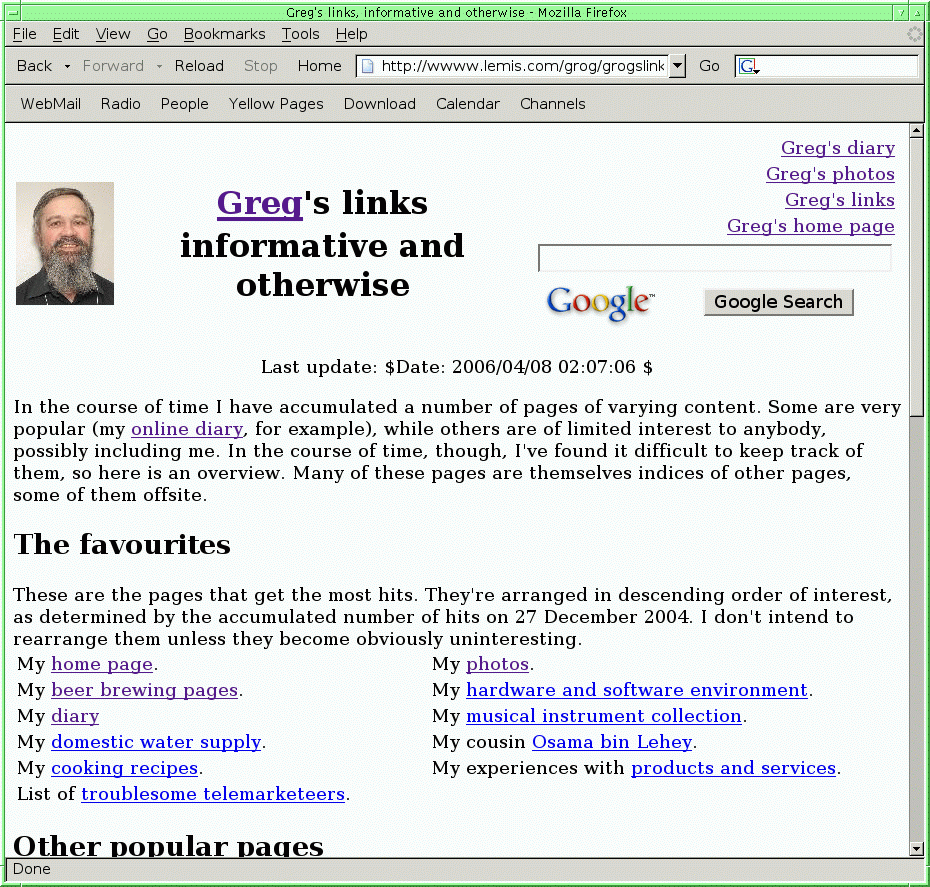
ceeveear.lemis.com. Compared to the echunga display, the characters are a little smaller, but for some reason the line spacing is too wide. I can't find a way to influence this.
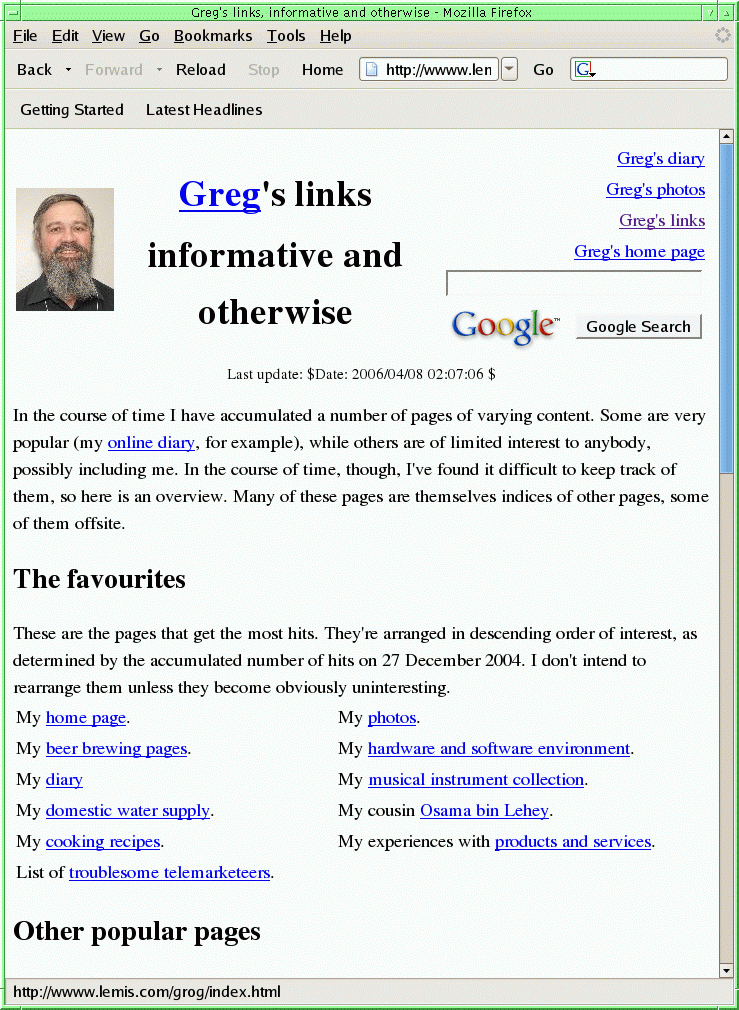
eucla.lemis.com. This is a laptop with a 1920x1200 display with 147 dpi. It is almost completely illegible. The original display size is 10 x 13.7 cm (4 x 5.5").
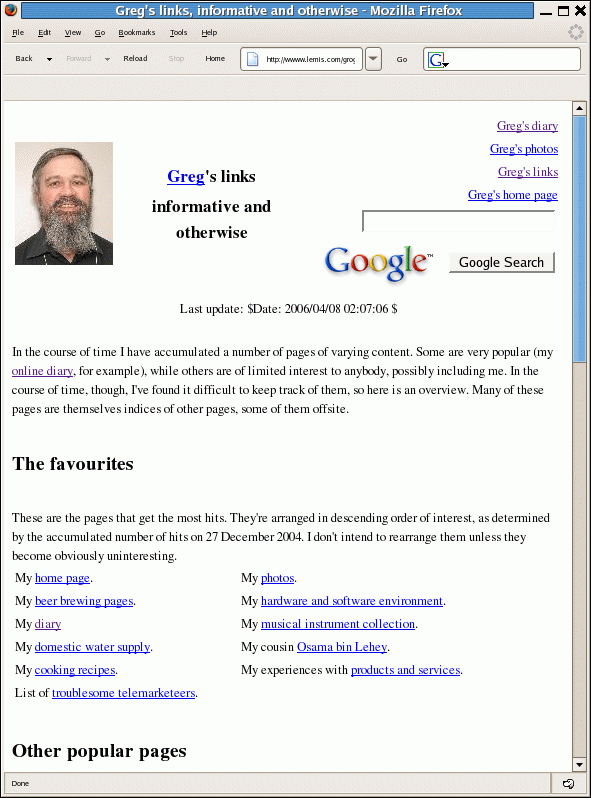
I can't work out where this is coming from. It's not a difference between FreeBSD and Linux; echungais running FreeBSD 6.1-PRERELEASE, while ceeveear and eucla are running Fedora Core 5.
You can't tell firefox how big the window should be when starting it. For decades, X clients have understood things like -geometry 900x1200+0+0, which tells the client to open a window 900 pixels wide and 1200 high and place it in the top left corner. firefox doesn't understand this, and the size of the windows you get on startup depends on what you did before you last shut down. It's frequent that I end up with firefox starting in full-screen mode, and getting it to open windows of more normal size is a matter of trial and error; simply resizing the current window and opening a new one doesn't help, though it may help to resize, close and then open a window.
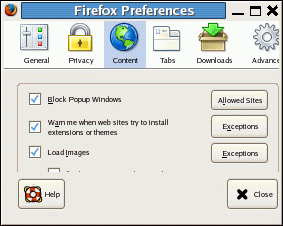
Where's the tab for “font size”? It's not displayed. First you need to expand the window to the full size (still only a large postage stamp):
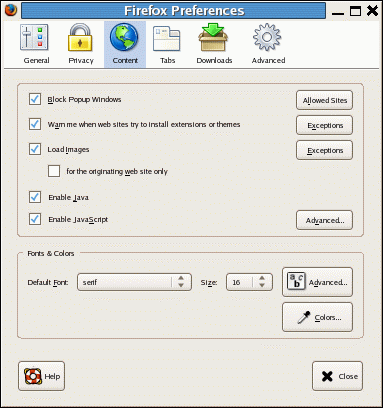
The only useful tab there is “Advanced on the right just below the middle. It gives the following display (again truncated, and it doesn't remember resizing, but you get the idea):
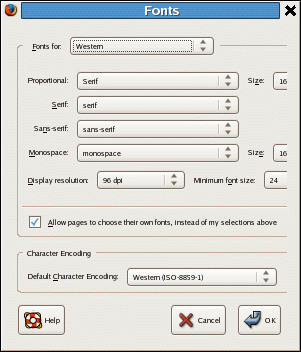
This shows, if not clearly, that I have selected 96 dpi (because it forgets the “customer settings”) and “character size” 24. That's the largest it will allow you to set. Nevertheless, the text at the top of main window is only about 6 pixels high, as xmag shows:
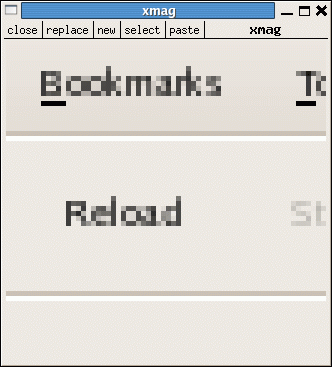
Clearly there's a problem here with firefox storing some configuration without asking for it, but I can't work out where it's coming from, nor how to fix it.
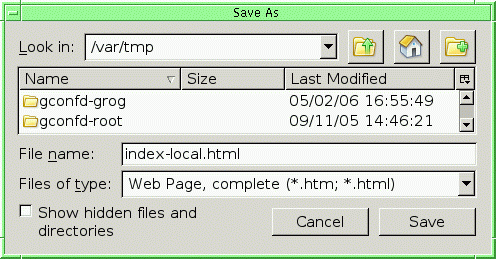
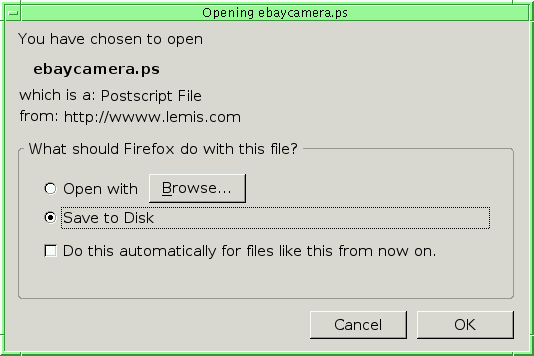
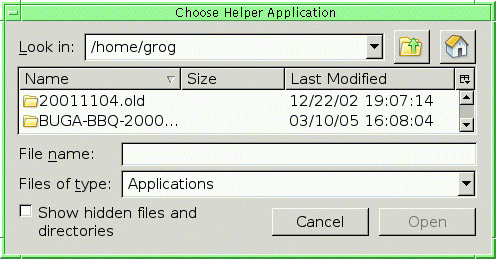
Even after entering ghostview, which is in the PATH, all I get is:
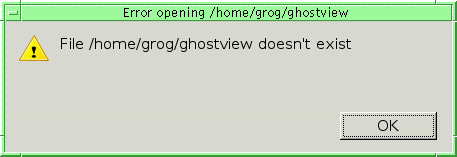
This requires me to run which to determine the complete path name for ghostview, then split it into the directory name (enter at top) and the file name (enter at bottom). This is more broken than any UNIX software was 20 years ago.
About the only thing I can say in favour of firefox is that all other web browsers seem to be equally broken. Is this progress?
Firing up firefox on eucla was surprising: a couple of days ago I got ridiculously small text;

When I fired it up today, I got:
Somehow this image has disappeared; maybe it was on the laptop before I got rid of it and I forgot to save it. I'll still looking. Unfortunately, I can't even recall what kind of breakage this was.
What changed? Well, I'm now running FreeBSD on it instead of Linux, which means a different firefox binary, but the preferences are the same (I use the same /home file system for both Linux and FreeBSD), so the preferences have not change at all. I still can't understand what is causing this.
I don't believe it! Only last month I was complaining about firefox brain-death, but now they've made it even worse! I tried to view a PDF document with the newly installed firefox, and was presented with the following dialogue box:

Last month I complained that firefox had broken the pathname into directory name and file name; now they've made it even worse. There is NO WAY to enter a file name. And of course, they still completely ignore the concept of search path for executables and offer me a directory containing ancient pre-Microsoft DOS as a potential candidate to view PDFs.
It didn't even give me any idea of how to find the executable. Went looking and found that my preferences are stored in a directory /home/grog/.mozilla/firefox/07vn6ri5.Default User/ (yes, with spaces in the path name!). Just getting there was difficult:
The background here is that I have a bash macro that changes the title on the xterm to display the directory name, using the /usr/ports/x11/xtset/ program. That strips off the \ in the input above, so it ends up with two parameters and tries to change to the first. This is indicative of the stupidity of using spaces in file names; they don't buy you anything, but they limit you in what you can do. Not coincidentally, it also broke the Emacs macro that I use when writing this diary to highlight the prompt colours.
In this directory I found a file mimeTypes.rdf which included the line:
NC:path="/compat/linux/usr/local/Adobe/Acrobat7.0/bin/acroread"
With the help of wh, another script, I established:
wh is pretty much like which(1), of course; the difference, apart from the ls -l format, is that it shows all executables in the path in sequence, not just the first one; this can be useful when things are behaving strangely because you're not executing the file you think you're executing.
So the problem was that the location of the executable had changed. No problem for a shell, but fatal because of firefox's brain-dead ignorance of PATH. Tried changing the pathname, with no success. Finally, quite angry, followed a maze of twisty little menus down to /usr/X11R6/bin/acroread. That worked, of course, but why have we been taken back to the stone age? Then went and compared the “before” and “after” state of the file:
--- mimeTypes.rdf~ Fri Jun 23 11:14:16 2006
+++ mimeTypes.rdf Fri Jun 23 11:13:57 2006
@@ -112,8 +112,8 @@
NC:prettyName=""
NC:path="" />
<RDF:Description RDF:about="urn:mimetype:externalApplication:application/pdf"
- NC:path="/usr/X11R6/bin/acroread"
- NC:prettyName="acroread" />
+ NC:prettyName="acroread"
+ NC:path="/usr/X11R6/bin/acroread" />
<RDF:Description RDF:about="urn:mimetypes">
<NC:MIME-types RDF:resource="urn:mimetypes:root"/>
</RDF:Description>
@@ -211,7 +211,7 @@
<RDF:Description RDF:about="urn:mimetype:handler:application/pdf"
NC:alwaysAsk="false"
NC:handleInternal="false"
- NC:useSystemDefault="true"
+ NC:useSystemDefault="false"
NC:saveToDisk="false">
<NC:externalApplication RDF:resource="urn:mimetype:externalApplication:application/pdf"/>
</RDF:Description>
The first set of diffs are just a change in sequence; the real difference is to unset “use system default” (which for some reason is also set to a null string). Why does this have to be so difficult? Are people losing all sense of reason?
firefox continues to infuriate me. Spent some time this morning trying to work out a good recipe for coconut chutney, and printed out the draft. The print settings had apparently been set to default—in this case, 15 point characters. What kind of default is this? Investigated and discovered that firefox has no idea at all about the basics of page layout:

Instead of point sizes, it talks in percentages—presumably of some undefined ”page size”. It seems independent of the size of the display, which is some consolation, anyway.
While experimenting with the settings, decided to print to a file. What directory was I offered? bin!

Why bin? Which bin? The one to throw firefox into? It didn't say, of course. Tried printing there—I didn't have permissions—to see what the error message was, but—there wasn't one. Where did it go? I searched the entire disk for a file, and that didn't exist either. It seems that firefox just ignored the problem.
Set the directory to /var/tmp (sorry, tmp) and was able to print to a file. Sort of:
For some reason, some characters were swapped. When I repeated the print (having to fill out “print to file” and the file name again), it printed correctly. I don't know what causes that, except maybe that the first time I overwrote an existing file.
I use the word “correctly” loosely. The line spacing was too small, and the margins were incorrect. Although I had selected DIN A4 and “metric” margins of 12.7mm, it printed the headers and footers on the edge of the paper, where most laser printers can't print anything. When I tried to print out my diary entry, it produced a page break after the header. On investigation, it proved to be this line:
<div align="justify">
Taking that out made the right margins ragged, of course, but the page break was gone. It didn't occur under opera, so I'd say that this is yet another bug in firefox.
Once again I'm left wondering how so much breakage can occur. We have at least:
This is the future of web browsers? O brave new world, That has such people in't! I've come to the conclusion that they made firefox extensible so that the team can say “If you don't like it, it's in your power to fix it”. This makes life easier for the team, but that's about the only advantage. It's certainly no excuse for writing such patently bad software.
I still don't know how to listen to MP3s on firefox; the attempt to set it up to use mpg123 (sorry, /usr/local/bin/mpg123, and not /home/grog/mpg123 which it seems to think is a good place to look) was successful in the sense that it has added it to the configuration, but when I try to listen to an MP3 via firefox, nothing happens, and it's not clear that the process got started.
Another disappointment is firefox 2.0. I upgraded to it recently and discovered that, even though I have done my damndest to disable this stupid “tabbed browsing” misfeature, it does it anyway under some circumstances, and I can't find a way to disable it. Today I tried updating a WikiPedia article, and pressed Alt-P for the preview. Nothing happened. I had to scroll down to the bottom and press the “Preview” button. When I was finally finished, I pressed Alt-S and was given some firefox function. So now I have lost more functionality. Every change in firefox seems to make it worse. Maybe there's a way to fix it—I hope so—but it wasn't obvious, and the configuration menus don't offer any help. Backed it out and installed the latest version of 1.5 instead.
Where is software development going? Am I really behind the times because I can't put up with things that make my life harder?
Had to restart firefox this morning. This program irritates me more and more. On restart, a window popped up with the message:
Firefox is currently not your default browser. Do you want it to be your default browser?
What does that mean? What's a “default browser” under UNIX? Why does everything have to be dumbed down to a Microsoft level? I've had this message before and answered “no”, which it obviously doesn't take for an answer. Decided to answer “yes” and see what happens. What I saw was multiple identical warnings:
(Gecko:98273): libgnomevfs-WARNING **: Deprecated function. User modifications to the MIME database are no longer supported.
Whatever it's doing, it's not doing it cleanly. But what's Gecko?
=== grog@wantadilla (/dev/ttyp3) ~ 188 -> man Gecko
=== grog@wantadilla (/dev/ttyp3) ~ 189 -> man gecko
=== grog@wantadilla (/dev/ttyp3) ~ 190 -> gecko
=== grog@wantadilla (/dev/ttyp3) ~ 191 -> Gecko
=== grog@wantadilla (/dev/ttyp3) ~ 192 -> locate -i /gecko
=== grog@wantadilla (/dev/ttyp3) ~ 193 ->
Obviously it doesn't exist. It appears to be part of GNOME, but I don't use that.
I had hardly put in my diary entry for yesterday before a number of people started pointing out that Gecko is the Mozilla layout engine. One of the replies was from Wojtek (surname unspecified) from the Opera project, who also suggested that Opera could work around the web site breakage at FreeBSD.org. I suppose I should try that again.
Spent the afternoon configuring multimedia on browsers, in the process reinstalling firefox 2.0 on teevee.lemis.com. Configuring plugins is a pain! I'm sure that the fact that I'm using a Linux version of firefox on FreeBSD doesn't help, but this brain death in firefox that starts a search for executables from your home directory (sorry, Desktop) and requires you to navigate one directory (sorry, folder) at a time infuriates me. Finally gave up and installed a port. There should be a port to install all normally used plugins.
Spent some time this morning looking at web browsers, in particular Opera. The initial results are mixed: on the positive side, it handles invalid or missing character encodings correctly, and it understands UNIX path names. There are still a number of other issues that I need to clarify before deciding to change over; in particular, I still can't start an external editor. Also, for some reason, different web pages display in markedly different font sizes, something that firefox doesn't do.
In the process, went back to see how Opera handles the breakage on the FreeBSD web site, and discovered that the breakage had been changed. On the positive side, the big discrepancy in size between normal and fixed-width text is gone; so is the fixed-width text. Instead, it has been put in sub-windows with scroll bars:
The headings still overlap here, though not on all browsers. On all browsers, the text at top right (yellow on light grey) is almost illegible. The yellow box in the middle has a text that isn't as wide as the screen, but instead of showing it full-width, it is artificially limited, both horizontally and (especially) vertically. Widening the display doesn't do anything useful; the text remains the same width, and the margins get wider.
What mentality is it that makes people want to see only part of something? Do we really want to be dumbed down to Microsoft levels? Is this the way to promote the FreeBSD project?
Mentioned this on the IRC channel, where the following discussion ensued (after an unrelated discussion about morons):
* groOgle looks at http://www.freebsd.org/cgi/query-pr.cgi?pr=101010&cat= and finds the morons uncomfortably close to home. * groOgle finds it highly disturbing that http://www.freebsd.org/cgi/query-pr.cgi?pr=101010&cat= renders acceptably (but not correctly) only under Microsoft. <Studded> works fine for me with firefox 2.0 in -current, what's IE doing differently? * Darius wonders if he dare ask how it should look <groOgle> Darius: Well, it shouldn't be limited to the middle of the screen, and it shouldn't have scroll bars to make it more difficult to read things. <groOgle> Studded: What do you mean by "fine"? <groOgle> Studded: Do you not have the wide margins and the stupid subwindows with scroll bars? <groOgle> Studded: And no overlapping text with firefox? <Studded> I have wide margins right now because the firefox window is wide open so I can look at the pkg-build logs <Studded> and the subwindow is a "feature" <groOgle> Studded: Sure, so the text should adapt. <groOgle> Studded: That a *serious* bug. <groOgle> Studded: It makes the whole project look stupid. <groOgle> Scroll bars are an admission of defeat. <groOgle> "Sorry, the window isn't wide enough to display this text, or it can't scroll vertically". <groOgle> But in this case, the window is double as wide as the scroll region, and it can scroll vertically. <Studded> a lot of sites have started using that same style of markup for attachments .... whether it's a good thing or not is open to debate, but it actually puts us more in the mainstream <groOgle> Studded: Sure. <groOgle> Studded: That shouldn't be open to debate. * groOgle glares at Studded. <Studded> it also lets you easily download just the attachment, which I consider a feature <groOgle> "Puts us more into the mainstream" == "Makes us look as stupid as the other 6E9 morons. * groOgle growls loudly, explodes, and leaves. ERC> /quit VOMIT!
I'm really getting frustrated with the current stupidity. Some people will call it a resistance to change, but they're missing the point. Yes, I've been around for a long time. But I'd really like to see things change—they just have to get better, not worse. Broken rendering has reached a level of stupidity I would never have believed possible.
Mail from Oliver Herold about configuring firefox. It seems that release 2.0 does support an external editor:
You can change the behaviour of Firefox with about:config, enter this as url.Look for the following variables, to use an external editor,
view_source.editor.external view_source.editor.pathThe first change to true, the latter to the right path, for example /usr/local/bin/vim -g will start vim in graphical mode after looking at the source code of a website.
This proved to be correct, but I couldn't find a way to enter the editor from an input field. Reading what Oliver wrote, it's not clear that you can: it seems that it's there for editing the source code of an external web page only. What use is that?
Did some more investigation and discovered also that there is another external editor, mozex, which seems to be more like what I'm looking for. But the released version is for Mozilla only, and you need the development version for firefox. Installed that and got a menu that allowed me to view page source or configure mozex; everything else, including “Edit textarea”, was greyed out. It stayed that way after I configured mozex. No idea where to go from here.
Spent more time investigating web browsers, with the result that I managed to get my fonts into an unrecoverable mess. Both in firefox and Opera now don't give me the font size I had set previously. It's either too big or too small, with no intermediate step:
I wonder what caused that; whatever it is, if I can't fix it, most people probably can't. Most people, I suspect, are “reasonable” and don't get annoyed about it. In this connection, it's interesting to note that firefox claims that the text is “20 pt” and “22 pt”, clearly not the correct relationship: the real ratio (based on measuring a specific line of text) is 16.7:21.5, or 1.29:1. I wondered whether this was due to loss of fonts, but I haven't changed anything, notably not the type face. Also, on a recommendation, I set the heading size explicitly with the following entry in my ~/.gtkrc-2.0:
gtk_font_name="Sans 10"
In other words, firefox thinks that the text size of the headers is 10 pt and the text is either 20 or 22 pt. What nonsense is that?
Also more investigation of external editors; Oliver Herold sent some suggestions, but again they appear to imply that the main purpose of the external editor is to edit the text of other web pages. Nobody seems to have cottoned on to the idea that this should be basic functionality.
They say that the web is gaining more and more importance in selling houses. But their web sites are such a mess that I personally wouldn't bother. Consider the agents we have called in and their web sites:
Looking at one property at random, I discover that the writeup contains a single photo of the outside of the property, no plan, and no details about the size of the rooms. There's also an open inspection some time: at the top, it's on Saturday, 16 December, and at the bottom it's on Sunday. What kind of information is that?
At the very bottom of the screen (after scrolling up) is a field with a text in characters 4x5 pixels in size. The following excerpt is 4 times natural size:

I discovered, with the help of estate agent Ans Papini, that this is where you need to enter the “Internet ID” quoted in their brochures; there's no reference to that in the brochure, and even Ans needed a while to find the way to do it.
Once you do find a property, you discover that the description is less than half what's in the printed brochure.
As the only agent to whom I mentioned these problems, Ans showed interest in improving things. As a result, I followed this one up in a little more detail:
I chose to look at the “Killara Park” property, because I have the brochure. I found the information on the web much less detailed than in the brochure. I don't understand why: printing brochures is expensive. Once they've done so, they could at least put the same copy up on the web. What I find on the web is:
The plans are missing (pages 2 and 7 of brochure). That's the first thing I look for in any property description.
There are no property details (page 3 of brochure). This would be the next thing I look at.
The description on pages 4 and 5 of the brochure seem to be more detailed than the corresponding description on the web site. I don't understand why there are two texts in the first place.
The brochure contains 9 photos, not including the photos of the salespeople. The web page has only 7.
Like all the web sites, Pope Nitschke requires flash. Unlike the others, though, they won't even display photos without it.
If it had displayed in the original window, there would have been plenty of space for the whole thing. Unfortunately, that's all they have to say about the property; the rest of the window shows some miniscule photos, but if you click on them you get Yet Another Popup Window with small photos, in a manner that you can only ever see one at a time. This is related to the tab mentality, of course, but it doesn't help you develop a feeling for the property.
To save space, they overlap the text.
Apart from that, the main issue is that the details are, once again, minimal. No plan, not even details of the individual rooms.
Of course, if I'm looking for a property, I probably won't start with an individual estate agent: I'll start with a site that covers all (or at least most) properties in the area. There are a number of them, too:
Without exception, all the sites failed the W3C HTML validation suite, and without exception they rendered incorrectly on firefox and safari, which together account for 14% of the web browsers on the market. You'd think that the estate agents would be prepared to sell to anybody, not just people who run Microsoft “Internet Explorer”. In my case, I suspect that the potential buyers for the house are more concentrated in that 14%. So why should I give my business to an estate agent who can't be bothered to address them?
All sites seem to be making the same mistakes:
So what do I do? I can write my own description, I suppose, and maybe that will help. But just think of the killing to be made by the first estate agent who gets his web site right!
A bit more work on multimedia today, mainly trying to get firefox to display the videos at SBS Food Safari. Attempts to display on wantadilla come up with the message Unknown Plugin (application/x-mplayer2), and the Manual Install takes me to Microsoft's Download Center. Why do they think that they can help? Interestingly, I have exactly the same problems with MacOS X Safari. I'm intrigued by the name mplayer2. It's probably an abbreviation for some Microsoft product name.
Finally “solved the problem” (a multimedia expression for “found the stepping stones to work around the crocodiles”) and re-installed firefox on teevee.lemis.com for the umpteenth time, this time version 2.0 with these horrible, not-turn-offable tabs and keymap that steals several keys, but with the ports www/linux-flashplugin7 and www/linux-mplayer-plugin, and it worked as well as SBS intended, which includes being forced to watch commercials with violent content and being unable to skip over them. Grr.
Back to work today, slowly. It seems that the Peters in Hahndorf are still occupied elsewhere, and for some reason our ssh tunnel keeps going down (how can I detect that and recover from it?), so spent today looking at keyboard multiplexers.
The keyboard multiplexer, /dev/kbdmux0, is part of the FreeBSD keyboard driver. It attaches multiple keyboards and gives them equal status. In our case we want to use only the USB keyboard for “real” keyboard input and use the AT port keyboard (/dev/atkbd0) for other purposes. That's provided for by the keyboard multiplexer, but for some reason detaching doesn't work, or maybe it reattaches immediately.
So, a job for kernel debugging, something I haven't done for months. Dragged out my tutorial on the topic, but still had heavy going. I need to put more information on kernel builds in one place, to make it more difficult to build a kernel that doesn't support debugging properly.
I've ranted enough about my dislike of the direction that firefox firefox has been takking lately, in particular that I couldn't get release 2.0 to run without “tabs”, a poor man's substitute for a window manager. Finally today I got a reply on the FreeBSD-STABLE mailing list that told me how to do it:
Now wouldn't it be nice if this (and all the other knobs) were documented somewhere? I haven't been able to find this kind of documentation so far.
I had barely posted yesterday's diary when Oliver Herold sent me a message pointing to a Wiki page about the firefox about:config pages. It looks very useful, but it's an external link, and it is currently out of date; this should be part of the official documentation.
More information on unofficial firefox documentation, this time from Marco Perez, who points me at kb.mozillazine.org and preferential.mozdev.org. I haven't looked at them in detail, but they seem to provide some useful information.
Quiet day today, spent reading and playing around with Internet radio. Why is it so difficult to get clear URLs for radio feeds? Discovered Realplayer's typically broken list of radio stations. Selecting them is a different matter; somehow I ended up with an mplayer plugin for the browser, which didn't work. It's not in the list of “download actions”, so I can't remove it. Moved it away instead, which at least gave me the option of browsing my home directory for likely programs to play the stream. Selected realplayer, but even then it couldn't handle all the URLs. There seem to be at least three different ways to pass the URL to realplayer:
<asx version="3.0">
<entry>
<title>Klassik</title>
<ref href="http://www.tv1.de/tv1/cms/_vm100/53864/asx" />
</entry>
</asx>
This one is from the realplayer page; why is it showing ASX? It also gives rise to one of the most stupid messages I've ever seen from firefox, a program I already find incredibly stupid:
firefox continues to be the most unreliable program I use: it crashes at least once a day. That's hardly a good advertisement for a showpiece of “Open Source”. It's really convenient that it can recover context on its many restarts. Today, though, after a crash it decided to present my private home page in a different font (sans-serif instead of serif), and in a smaller font. It didn't do the same for the identical copy on the external site. It took something like 20 minutes of changing the preferences (ultimately to what they had been) to get back to normal. I wish I could find a usable browser, but all of them have some really annoying feature that I can't turn off, or they lack functionality.
Did some work on the German Wikipedia, adding my first new page in any Wikipedia. There's a link in there to the entry in the “Deutsches Wörterbuch” (German dictionary) of the Brothers Grimm, which caused firefox to completely blow the mind of the X server: just finding the entry and linking to it used about 20 minutes of CPU time, and took me about an hour. On the Apple with Safari it was slow—several seconds—but bearable. I wonder what's wrong there.
| Greg's home page | Greg's diary | Greg's photos | Copyright |